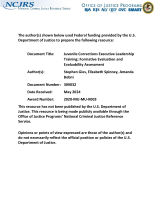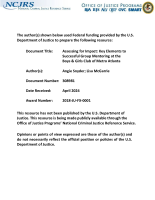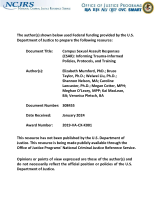Best practices
Collaborative Strategies in Safeguarding Children: A Community-Centric Approach to Overdose Response
Improving police-public relationships through intergroup contact: A mixed-methods evaluation of the Voices communication intervention
Coordinated Strangulation Incident Response Training for Law Enforcement Officers and Emergency Medical Personnel Lesson Plan
Improving Assault Victim Contact: From Evidence to Action
Understanding the Impact of COVID-19 on Victim Services
The COVID-19 pandemic had a detrimental impact on communities across the nation and significantly affected various aspects of individuals’ lives. One of the negative impacts was an increase in gender-based violence accompanied by shifting barriers to accessing services and support. Victims and victim service providers faced various challenges dealing with the increase in need for services, navigating barriers to help-seeking, and addressing logistical issues.
See the YouTube Terms of Service and Google Privacy Policy
Juvenile Corrections Executive Leadership Training: Formative Evaluation and Evaluability Assessment
Assessing for Impact: Key Elements to Successful Group Mentoring at the Boys & Girls Club of Metro Atlanta
The Long-term Collateral Consequences of Juvenile Justice Involvement for Females
Best Practices for Optimizing Law Enforcement Job Descriptions to Recruit Diverse Candidates
Transforming Correctional Culture and Climate
Borrowing from innovations abroad, U.S. correctional facilities are piloting more humane living environments that are grounded in principles of restorative justice to support rehabilitation and enhance safety for all who work and reside in them.
Countering the Emerging Drone Threat to Correctional Security
Promoting School Safety Through Multi-tiered Systems of Support for Student Mental Health
White Paper – Evolving Approaches And Technologies For Seized Drug Analysis
Attitudes of Reporting Officers Extracted From Incident Reports Can Affect Rape Case Outcomes
Attitudes of Reporting Officers Extracted From Incident Reports Can Affect Rape Case Outcomes
Social scientists and data scientists use a powerful machine learning algorithm to conduct a novel criminal justice process study.
Collection, Storage, and Use of Client Data: Considerations and Recommendations for Human Trafficking Service Providers
Campus Sexual Assault Responses (CSAR): Informing Trauma-Informed Policies, Protocols, and Training
Admitting to uncertainty in the LR
Forgotten Evidence: A Mixed Methods Study of Why Sexual Assault Kits (SAKs) Are Not Submitted for DNA Forensic Testing
Criminal Record Questions in the Era of "Ban the Box"
Evaluation of the Cook County Community Based Transitional Services for Female Offenders Program
Best Practices for Improving the Use of Criminal Justice Risk Assessments: Insights from the National Institute of Justice’s 2021 Recidivism Forecasting Challenge Winners Symposium
Best Practices for Improving the Use of Criminal Justice Risk Assessments: Insights From NIJ’s Recidivism Forecasting Challenge Winners Symposium
Winners from NIJ’s Recidivism Forecasting Challenge share their approaches to employing risk assessments and recommendations for practitioners and scientists.





